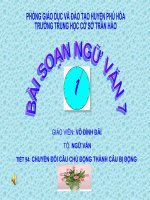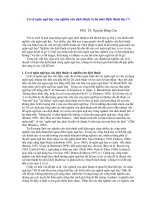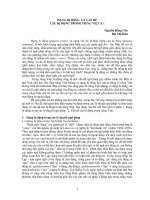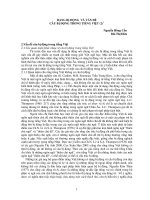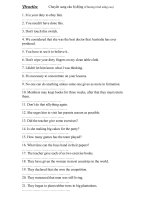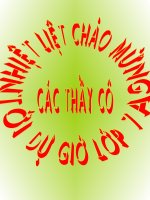chuyên đề câu bị động
Bạn đang xem bản rút gọn của tài liệu. Xem và tải ngay bản đầy đủ của tài liệu tại đây (159.06 KB, 20 trang )
CÂU BỊ ĐỘNG
(Passive Voice)
1. Use of Passive (Cách sử dụng của câu bị động) :
Câu bị động được dùng khi ta muốn nhấn mạnh vào hành động trong câu, tác nhân
gây ra hành động dù là người hay vật gì cũng không quá quan trọng.
Ex: My bike was stolen.
A mistake was made.
2. Form (Cấu trúc):
S +(V) + O SO + (BE) + P2 + BY + OS
• Tân ngữ câu chủ động thành chủ ngữ câu chủ động.
• Câu chủ động ở thì nào thì “be” ở câu bị động chia ở thì đó.
• By + O đứng trước trạng ngữ chỉ thời gian, đứng sau trạng ngữ chỉ nơi
chốn. Nếu sau “by” là đại từ vô nhân xưng mang nghĩa người ta như
by people, by somebody,… thì ta bỏ “by o” đi.
• Nếu là người hoặc vật trực tiếp gây ra hành động thì dùng “by” nếu là
vật gián tiếp gây ra hành động thì dùng “with”.
Ex: The bird was shot with the gun. The bird was shot by the hunter.
• Trong một số trường hợp “be/ get +P2” hoàn toàn không mang nghĩa
bị động mà mang 2 nghĩa:
Chỉ trạng thái, tình huống mà chủ ngữ đang gặp phải:
Ex: Could you please check my mailbox while I am gone ?
He got lost in the maze (mê cung) of the town yesterday.
Chỉ việc chủ ngữ tự làm lấy:
Ex: The little boy gets dressed very quickly.
I will be done when I finish tightening these bolts (những
con ốc).
• Với động từ khuyết thiếu (MV) : Can, may, must, should, have to,
ought to, used to
S+ (MV) + V + O So + (MV)+ be + P2 +by +O
Các thì
Chủ động
1. Hiện tại đơn
2. Hiện tại tiếp diễn
S + V(s/es) + O
Bị động
S+ is/am/are + P2 + (by + O)
Ví dụ:
Ví dụ:
- Mary studies English every day.
- English is studied by Mary everyday.
S + is/am/are + V-ing + O
Ví dụ:
S + is/am/are + being + P2 + (by + O)
Ví dụ:
- He is planting some trees now.
3. Quá khứ đơn
4. Quá khứ tiếp diễn
S + V-ed + O
S + was/were + P2 + (by + O)
Ví dụ:
Ví dụ:
- She wrote a letter yesterday.
- A letter was written (by her) yesterday.
S + was/were + V-ing + O
S + was/were +being + P2 + (by + O)
Ví dụ:
Ví dụ:
- They were buying a car at 9 am
yesterday.
- A car was being bought at 9 am
yesterday.
5. Hiện tại hoàn thành
6. Hiện tại hoàn thành
tiếp diễn
- Some trees are being planted (by him)
now.
S + have/ has + P2 + O
S + have/ has + been + P2 + (by + O)
Ví dụ:
Ví dụ:
- My parents have given me a new
bike on my birthday.
- A new bike has been given to me by my
parents on my birthday.
S + have/ has + been + V-ing + O S + have/ has + been + being + P2 +(by
+ O)
Ví dụ:
Ví dụ:
- This car has been being repaired by John
- John has been repairing this car for
for 2 hours.
2 hours.
7. Quá khứ hoàn thành
S + had + P2 + O
Ví dụ:
S + had + been + P2 + (by O)
Ví dụ:
- He had finished his report before 10 - His report had been finished before 10
p.m yesterday.
p.m yesterday.
8. Quá khứ hoàn thành
tiếp diễn
S + had + been + V-ing + O
Ví dụ:
Ví dụ:
- I had been typing the essay for 3
hours before you came yesterday.
9. Tương lai đơn
S + had + been + being + P2 + (by+ O)
S + will + V(nguyên thể) + O
- The essay had been being typed for 3
hours before you came yesterday.
S + will + be + P2 + (by O)
10. Tương lai tiếp diễn
Ví dụ:
Ví dụ:
- She will do a lot of things
tomorrow.
- A lot of things will be done tomorrow.
S + will + be +V-ing + O
11. Tương lai hoàn thành
S + will + be + being + P2 + (by O)
Ví dụ:
Ví dụ:
- She will be taking care of her
children at this time tomorrow
- Her children will be being taken care of
at this time tomorrow.
S + will + have + P2 + O
Ví dụ:
S + will + have + been + P2 + (by O)
Ví dụ:
- She will have finished her studying - Her studying will have been finished by
by the end of this year.
the end of this year.
12. Tương lai hoàn thành S + will + have + been + V-ing + O S + will + have +been + being + P2 + (by
tiếp diễn
O)
Ví dụ:
Ví dụ:
- I will have been teaching English
for 5 years by next week.
- English will have been being taught by
me for 5 years by next week.
3. Một số câu bị động đặc biệt:
•
Cấu trúc câu bị động nhờ ai làm gì đó làm gì:
S + (have) + Ochỉ người + V + Ochỉ vật / S + (get) + Ochỉ người + to V
+ Ochỉ vật
S + (have) / (get) + Ochỉ vật + P2 + (by +Ochỉ người )
Ex: I have Tom cut my hair. I have my hair cut (by Tom).
My mother gets me to bring the chair into the room. My mother
gets the chair brought into the room.
• Với “Make” (bắt buộc ai làm gì):
S + (make) + O + V + … So + (be) + made + to V …
Ex: He makes me work harder. I am made to work harder.
• Với “ let” (để ai làm gì/ cho phép ai làm gì):
S + (let) + O + V So + (be) + allowed + to V
Ex: He lets me drive his car. I am allowed to drive his car.
• Bị động đối với động từ chỉ ý kiến, thông báo:
Các động từ : Say, think, believe, suppose (giả sử), report (thông
báo), suspect(nghi ngờ), rumor (đồn), consider (băn khoăn, cho rằng)
… (V1)
S1 + (V1) + that + S2 + (V2) + …
Cách 1:
It + (be) + P2 (V1) + that + S2 + (V2)
Cách 2:
S2 + (be) + P2
(V2) +
to V ( nếu V1, V2 cùng thì, hoặc V2 xảy ra sau V1 )
to have P2 (nếu V2 chia ở các thì hoàn thành, hoặc V2
xảy ra trước V1)
Ex: People said that she was very kind.
-> It was said that she was very kind.
-> She was said to be very kind.
• Bị động với nhóm V chỉ giác quan
S + V1 (see / hear/ feel/ watch/ observe/ catch …) + O + V2/ V2-ing (nếu
V2 đang xảy ra)
→ So +( be) + P2 (V2) + to V / Ving
Ex: I saw him climbing over the wall.
→ He was seen climbing over the wall.
I heard her sing a very beautiful song.
→ She was heard to sing a very beautiful song.
•
Bị động với động từ 2 tân ngữ (riêng “buy” thì dùng “to”): buy, give,
show, tell, ask, teach, send ,bring…
S + (V) + Ongười + Ovật
S(Ongười) + (be) + P2 + Ovật (by + Os)
S(Ovật) + (be) + P2 + to Ongười (by Os)
Thông thường chủ ngữ hợp lý cho câu bị động là Ovật
Ex: My friend gave me a present on my birthday.
A present was given to me by my friend on my birthday/ I was
given a present on my birthday by my friend.
• Bị động với cấu trúc chủ ngữ giả :
It + (be) + adj + to V + O → It + (be) + adj + for O + to be + P
Ex: It's necessary to learn English.
→ It's necessary for English to be learnt.
It's important to prepare the lessons before school.
→ It's important for the lessons to be prepared before school.
Note: Khi trong câu dùng: "possible" hoặc "impossible"
→ can be done/ can't be done
Ex: It's impossible to learn a foreign language in a week.
→ A foreign language can't be learnt in a week.
It's impossible to do this.→ This can't be done.
• Bị động đối với câu mệnh lệnh:
V + O Cách 1: S + should/must + be +P2.
Cách 2: Let O be P2
Ex: Turn on the lights! The lights should be turned on.
Write your name here. Let your name be written here.
Bài tập:
I. Put these sentences into the passive voice.
1.My father waters this flower every morning.
2.John invited Fiona to his birthday party last night.
3.Her mother is preparing the dinner in the kitchen.
4.We should clean our teeth twice a day.
5.Our teachers have explained the English grammar.
6.Some drunk drivers caused the accident in this city.
7.Tom will visit his parents next month.
8.The manager didn’t phone the secretary this morning.
9.Did Mary this beautiful dress?
10.I won’t hang these old pictures in the living room.
11.The German didn’t build this factory during the Second World War.
12.The Greens are going to paint this house and these cars for Christmas Day.
13. Ann had fed the cats before she went to the cinema.
14.The students have discussed the pollution problems since last week.
15.Have the thieves stolen the most valuable painting in the national museum?
16. The waiter brings me this dish.
17. Our friends send these postcards to us.
18.Their grandmother told them this story when they visited her last week.
19.Tim ordered this train ticket for his mother.
20.You didn’t show me the special cameras.
21.She showed her ticket to the airline agent.
22.He lends his friend his new shoes.
23.She left her relatives five million pounds.
24.The shop assistant handed these boxes to the customer.
25.The board awarded the first prize to the reporter.
II. Write the sentences in another way, beginning as shown.
1. Someone reported that the situation was under control.
The situation ___________________________________
2. It is said that she works 16 hours a day.
She ______________________________________________
3. Someone thinks that the company is planning a new advertising campaign.
The company ______________________________________
4. Everyone expects that the soap opera will end next year.
The soap opera __________________________________
5. It is alleged that the man drove through the town at 90 miles an hour.
The man _________________________________________
6. Someone reported that the President had suffered a heart attack.
The President ___________________________________
7. They think that the prisoner escaped by climbing over a wall.
The prisoner ____________________________________
8. It is reported that the buildings have been badly damaged by fire.
The buildings __________________________________
9. It is reported that many people are homeless after the floods.
Many people ____________________________________
10. We all expected Marta would pass her driving test.
Marta _________________________________________
11. People believe that he was killed by terrorists.
He ____________________________________________
12. We knew that you were in town on the night of the crime.
You _____________________________________________
13. Journalists supposed that the footballer Wayne Johnson was earning £10
million a year.
The footballer Wayne Johnson __________________________
14. It is said that there is a secret tunnel between those two houses.
There _____________________________________________
15. We know that they lives in a small flat on the fifth floor.
They_______________________________________________
16. Lots of people believe that the Prime Minister and his wife have separated.
The Prime Minister________________________________
17. It is believed that the boy is wearing a white pullover and blue jeans.
The boy___________________________________________
18. Everyone expects that the hostages will be released soon.
The hostages______________________________________
19. It is reported that two people were injured in the explosion.
Two people_______________________________________
20. They say exercise is good for health.
Exercise _________________________________________
III. Put these sentences into the passive voice.
1. I had my nephew paint the gate last week.
2.People don’t make the children work hard.
3. We heard her singing loudly.
4. John gets his sister to clean his shirt.
5. Anne had had a friend type her composition.
6.I sometimes see him go out.
7.They don’t let us beat their dog.
8.I see him bathing her dog now.
9.My parents never let me do anything by myself.
10.They have her tell the story again.
11.She let him enter the room.
12. I have heard her sing that song several times.
13. People saw him steal your car.
14. He won’t let you do that silly thing again.
15. The teacher is watching them work.
16. She will have Peter wash her car tomorrow.
17.They made him work all day.
18.Someone should look into the matter.
19.Open your book!
20. Take off your hat!
IV. Choose the correct answer.
1. We can’t go along here because the road _____.
a. is repairing b. is repaired c. is being repaired d. repaires
2. The story I’ve just read _____ Agatha Christie.
a. was written b. was written by c. was written from d. wrote by
3. Why don’t you have your brother _____ the roof?
a repairs b. repair c. repaired d. to repair
4. The man died because medical help was not summoned. A doctor should
_____.
a. be have called b. been called c. be called d. have been called
5. Something funny _____ in class yesterday.
a. happened b. was happened c. happens d. is happened
6. Many US automobiles _____ in Detroit, Michigan.
a. manufacture b. have manufactured
c. are manufactured d. are manufacturing
7. A lot of pesticide residue can _____ on unwashed produce.
a. find b. found c. be finding d. be found
8. We _____ by a loud noise during the night.
a. woke up b. are woken up c. were woken up d. were waking up
9. How did that window _____? ~ I don’t know.
a. get broken b. broke c. got broken d. broken
10. Some film stars _____ difficult to work with.
a. are said be b. are said to be c. say to be d. said to be
11. Last night a tornado swept through Rockville. It _____ everything in its
path.
a. destroyed b. was destroyed
c. was being destroyed d. has been destroyed
12. Vitamin C _____ by the human body. It gets into blood stream quickly.
a. absorbs easily b. is easily absorbing
c. is easily absorbed d. absorbed easily
13. Why did Tom keep making jokes about me? I don’t enjoy _____ at.
a. be laughed b. to be laughed c. laughing d. being laughed
14. John _____ last week.
a. had his house painted b. had painted his house
c. had his father to paint d. had his house paint
15. Today, many serious childhood diseases _____ by early immunization.
a. are preventing b. can prevent c. prevent d. can be prevented
16. ‘_____ about the eight o’clock flight to Chicago?’ ‘Not yet.’
a. Has been an announcement made b. Has an announcement made
c. Has an announcement been made d. Has been made an announcement
17. ‘Has the commitee made its decision yet?’
‘Not yet. They are still _____ the proposal.’
a. considering b. been considered c. being considered d. considered
18. I might watch this programme. It _____ very funny.
a. supposes to be b. is supposed being
c. is supposed to be d. was supposed be
19. Do you get your heating _____ every year?
a. checking b. check c. be checked d. checked
20. Claude Jennings is said _____ his memory.
a to have been lost b. to be lost
c. to have lost d. to lose
RELATIVE CLAUSES
(MỆNH ĐỀ QUAN HỆ)
I. Ví dụ và định nghĩa:
+ I have just bought a book. It is about the history of the English language.
=> I have just bought a book which is about the history of the English language.
+ Laura has just won the first prize in the city’s piano contest. She is my best friend.
=> Laura, who is my best friend, has just won the first prize in the city’s piano contest.
+ Last year we visited a house. Shakespeare was born there.
=> Last year we visited the house where Shakespeare was born.
* Mệnh đề quan hệ (MĐQH) là mệnh đề phụ bổ nghĩa cho danh từ ngay trước nó.
* MĐQH thường bắt đầu bằng một đại từ quan hệ (ĐTQH)-chỉ người/sở hữu, sự vật/sự
việc- hoặc một trạng từ quan hệ (TTQH)-chỉ địa điểm, thời gian, lí do.
II. Các ĐTQH và TTQH:
1. Who: chỉ người (làm S hoặc O) – đứng sau danh từ chỉ người.
EX: + We met some local people. They were very helpful.
=> We met some local people who are very helpful.
2. Whom: chỉ người (làm O) – sau danh từ chỉ người nhưng làm O trong MĐQH. Whom
có thể đứng sau một giới từ. Chủ yếu được dùng trong văn viết hoặc các trường hợp giao
tiếp trang trọng.
EX: The man was very friendly. We talked to him.
=> The man whom (who) we talked to was very friendly.
= The man to whom we talked was very friendly.
3. Whose: chỉ sở hữu. Whose có thể đứng sau một danh từ chỉ người hoặc chỉ vật nhưng
nhất thiết sau nó phải kèm theo một danh từ. (trong trường hợp chỉ sở hữu của vật cũng
có thể dùng: the N of which)
EX: Do you know a word? Its meaning is similar to ‘courteous’.
=> Do you know the word whose meaning is similar to ‘courteous’?
(Do you know the word the meaning of which is similar to ‘courteous’?)
4. Which: chỉ vật (làm S hoặc O) – đứng sau danh từ chỉ vật. Which có thể đứng sau một
giới từ.
5. That: có thể thay thế cho who, whom hoặc which trong MĐQH xác định. Thường
được dùng trong các trường hợp sau: sau cụm từ chỉ cả người và vật; sau các cụm danh từ
có chứa ‘the only’, so sánh tuyệt đối, ‘all’, ‘some’, ‘any’, …; cấu trúc nhấn mạnh: It’s …
that …
6. Where: chỉ nơi chốn (= in/at/on/… - which)
EX: The restaurant was comfortable. We had dinner in it (there).
=> The restaurant where we had dinner was comfortable.
= The restaurant in which we had dinner was comfortable.
7. When: chỉ thời gian (= in/at/on/… - which)
EX: I will never forget a day. The disastrous storm swept off almost everything of mine
on this day.
=> I will never forget the day when the disastrous storm swept off almost everything
of mine.
= I will never forget the day on which the disastrous storm swept off almost
everything of mine.
8. Why: chỉ lý do (= for – which)
EX: Do you know the reason? He decided to quit his passion for this reason (for it).
=> Do you know the reason why he decided to quit his passion?
= Do you know the reason for which he decided to quit his pasion?
III. MĐQH xác định và MĐQH không xác định
(Definite and non-definite relative clauses)
1. MĐQH xác định:
EX: Can you lend me the book which you told me about yesterday?
(Xác định rõ chính là quyển sách bạn đã kể cho tôi nghe ngày hôm qua)
* MĐQH xác định cần thiết trong câu để xác định rõ danh từ mà nó bổ nghĩa. Nếu lược
bỏ câu sẽ không rõ về nghĩa.)
* Khi viết không có dấu phẩy giữa MĐQH xác định và MĐ chính của câu.
2. MĐQH không xác định:
EX: Ha Long Bay, which is one of the wonders of the world, is among the most famous
tourist
attractions in Vietnam.
(Chỉ bổ sung thêm thông tin cho danh từ mà nó bổ nghĩa vì danh từ đó đã được xác định.)
* MĐQH không xác định chỉ bổ sung thêm thông tin cho danh từ mà nó bổ nghĩa. Nếu
lược bỏ, câu vẫn rõ về nghĩa.
* Khi viết có dấu phẩy giữa MĐQH không xác định và MĐ chính khi MĐQH xen vào
giữa câu.
* MĐQH không xác định thường thấy trong các trường hợp sau: sau danh từ chỉ tên
riêng; sau cụm từ có các từ chỉ định: this. these, that, those; sau cụm từ có tính từ sở hữu:
my, our, your, his, …
RELATIVE CLAUSES - EXERCISES
I. Cirle the best option to complete each sentence:
1. The scientist _________ invention was a success became famous
A. who
B. whose
C. which
D. that
2. The man _________ you met at the party was a famous film star
A. who
B. that
C. whom
D. all are correct
3. My neighbour, _________ brother is an actor, gave me some theatre tickets
A. who
B. whom
C. which
D. whose
4. We are talking about the writer _________ latest book is one of the best-sellers this
year
A. which
B. who
C. whom
D. whose
5. The people _________ called me yesterday want to buy your house
A. who
B. whose
C. whom
D. which
6. A newspaper _________ is published every day is called a daily newspaper
A. who
B. which
C. that
D. b and c
7. That is the man _________ told me the bad news
A. who
B. whom
C. whose
D. which
8. Bologna in Northern Italy is the place _________ Guglielmo Marconi was born
A. there
B. where
C. what
D. which
9. The boy _________ eyes are brown is my friend
A. who
B. whose
C. which
D. whom
10. My uncle _________ you met yesterday is a lawyer
A. which
B. what
C. whose
D. whom
II. Fill the blanks with Relative pronoun or Relative adverbs, put commas when
they are needed
1. The book ……………………. I need can’t be found in the library
2. Here is the beach ……………………. is the safest for swimmers
3. Do you know the American woman ……………………. name is Margaret Mitchell?
4. Jim ……………………. I have known for ten years is one of my closest friends
5. That woman ……………………. name I don’t remember is a doctor
6. Children enjoy reading the books ……………………. have coloured pictures
7. The noise ……………………. he met woke everybody up
8. I know a place ……………………. roses grow in abundance
9. We must find a time ……………………. we can meet and a place
……………………. we can talk
10. The teacher with ……………………. we studied last year no longer teaches in our
school
11. Mr. Brown ……………………. is only 34 is the director of this company
12. Let me see all the letters ……………………. you have written
13. Is there anyone ……………………. can help me do this?
14. Alexander Flemming ……………………. discovered penicillin received the Nodel
Prize in 1945
15. We saw many soldiers and tanks ……………………. were moving to the front
III. Combine each pair of sentences below
1. The officer wasn’t very friendly. I spoke to him yesterday
………………………………………………………………………………………………
.………….
2. The dog was very frightened. The boys threw stones at it
………………………………………………………………………………………………
.………….
3. The road was built in 1980. We are driving on it
………………………………………………………………………………………………
.………….
4. Did you see the letter? It came yesterday morning
………………………………………………………………………………………………
.………….
5. The man called the police. His wallet was stolen
………………………………………………………………………………………………
.………….
6. My father goes swimming everyday. You met him this morning
………………………………………………………………………………………………
.………….
7. I love my parents’ house. I was born in that house
………………………………………………………………………………………………
.………….
8. The town is small. I grew up there
………………………………………………………………………………………………
.………….
9. I’ll never forget the day. I first met you then
………………………………………………………………………………………………
.………….
10. The picture was beautiful. She was looking at it
………………………………………………………………………………………………
.………….
11. This is the house. We often stay in this house in the summer
………………………………………………………………………………………………
.………….
12. This is Mrs. Jones. Her son won the championship last year
………………………………………………………………………………………………
.………….
13. You sent me a present. Thank you very much for it
………………………………………………………………………………………………
.………….
14. Mary and Margaret are twins. You met them yesterday
………………………………………………………………………………………………
.………….
15. I like standing at the window. I can see the park from this window
………………………………………………………………………………………………
.………….
16. I do not know the reason. She left school for it
………………………………………………………………………………………………
.………….
17. The police want to know the hotel. Mr.Foster stayed there two weeks ago
………………………………………………………………………………………………
.………….
18. The man is a famous actor. You met him at the party last night
………………………………………………………………………………………………
.………….
19. There are some words. They are very difficult to translate
………………………………………………………………………………………………
.………….
20. The woman was a secretary. We were waiting for her.
………………………………………………………………………………………………
.………….
21. Sandra works in advertising. You were talking to her
………………………………………………………………………………………………
.………….
22. The man is very young. You are driving his car
………………………………………………………………………………………………
.………….
23. Who is the woman? Our teacher is talking to her?
………………………………………………………………………………………………
.………….
24. The day was rainy. She left on that day
………………………………………………………………………………………………
.………….
25. The city was beautiful. We spent our vacation there
………………………………………………………………………………………………
.………….
